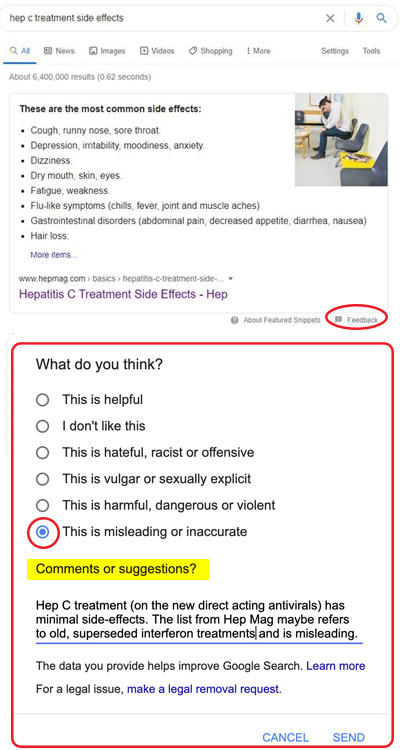The Champion #86 – July 2020
This issue:
- No fake news: Clearing the Path keeps on keeping on
- Hepatitis NSW believes Black Lives Matter
- Postcards from prison: a creative way to support NSW prisoners
- Community hep B communication campaign continues!
- One Google search can undo all our good work…

No Fake News: Clearing the Path keeps on keeping on

Clearing the Path – the current NSW Hepatitis C communications campaign – will now be ramped up for the remainder of this year. Due to COVID-19, the HEP CURED campaign – which emphasised “connection” – has been put on hold for the time being.
Using bright, eye-catching artwork, Clearing the Path will see wall posters, street pole posters, pull up banners, and pubs and clubs washroom advertising displayed across each Local Health District (LHD). The artwork will be displayed in locations close to NSPs with high foot traffic. The messaging focuses on the availability and effectiveness of new hep C treatments.
Some inner-city walls will have huge posters, creating fab, photo-worthy backdrops for people walking the lane ways around Central Station. In addition, Sydney CBD will have 100 street banners fluttering with campaign artwork, providing a huge burst of colour across the city’s otherwise grey wintry landscape.
Attractive “pop art” styled giveaways – pens, hand sanitiser, T-shirts, and fold-out concertina-cards – will give people small, portable, and useful items to take with them, helping spread the word of hep C cure to their personal networks.
Peer promotion by trained peer workers from Hepatitis NSW and NUAA, alongside clinical services, are an essential part of the campaign. As LHDs resume or extend COVID Safe face-to-face services, peers will be integral in helping to increase access to testing and treatment.
- To order posters for your service >>> CLICK HERE
- See the Hep C Campaign website>>> CLICK HERE
Hepatitis NSW believes Black Lives Matter

It is tragic that it took yet another death of a black person at the hands of law enforcement – in this case, George Floyd of Minnesota, U.S.A. – for the world to engage in a discussion about racism. Discrimination of any sort creates unnecessary division; perpetuates oppression and disadvantage; diminishes society and culture; and imposes huge economic and health burdens on individuals and society.
In Australia, we must recognise, acknowledge, and accept the institutional racism that exists in our own backyard. However, a recent Essential Poll show that almost 80% of Australians believe Americans are correct to demand better treatment for African Americans in their society – but only 30% believe there is institutional racism in Australian police forces.
Nevertheless, the figures paint a different reality. There have been at least 437 deaths of Aboriginal and Torres Strait People in custodial settings recorded since the Royal Commission into Aboriginal Deaths in Custody ended in 1991. Comparing Australia with the United States, a 2019 report shows that Aboriginal and Torres Strait Islander people are more likely to be in prison than African Americans. Over the past three decades, the share of Indigenous adults in prison has more than doubled – from 1,124 per 100,000 adults in 1990 to 2,481 per 100,000 adults in 2018.
Aboriginal and Torres Strait Islander peoples are incredibly resilient, having lived on, and thrived and cared for this country for over 60,000 years. However, due to the ongoing impacts of colonisation and institutional racism, Aboriginal and Torres Strait Islander people have poorer health outcomes and lower life expectancy than non-Indigenous Australians. In relation to viral hepatitis, Aboriginal and Torres Strait Islander peoples are disproportionately affected by both hepatitis B and hepatitis C.
While Aboriginal and Torres Strait Islander peoples make up 3% of the Australian population, it was estimated in 2018 that they made up 6.3% of Australians living with chronic hepatitis B – that’s around 14,277 people from 226,612. We are committed to working towards rectifying this stark inequity.
While there is no current estimate of Indigenous hepatitis C population prevalence, modelling from 2007 estimated there were between 13,000 and 22,000 Aboriginal and Torres Strait Islander peoples living with hepatitis C. Each year, it is estimated Aboriginal and Torres Strait Islander peoples constitute at least 11% of newly reported cases of hepatitis C. Infections in people aged under 25 years were six times higher among Aboriginal and Torres Strait Islander peoples than for non-Indigenous people (12.2 per 100,000).
With Aboriginal and Torres Strait islander people making up a disproportionate number of people in custodial settings, and the prevalence of hepatitis C estimated at 30% among people in NSW prisons, being in prison is a significant risk factor for hepatitis C exposure for Aboriginal and Torres Strait Islander people.
If we are to move forward as a nation, we must recognise the roles we each play and the systems we uphold that make this the reality of life in Australia for First Nations people. This is not acceptable. We can do more. We must do more.
We will not be complacent. We will not be complicit.
Postcards from prison: a creative way to support NSW prisoners

Hepatitis NSW has produced a set of four colouring-in postcards for prisoners – along with a kit of other goodies – that will not only promote our services and information about hep C, but also give people in prison some material for personal activities.
There are approximately 13,000 people currently in NSW prisons, where rates of hepatitis C infection can be as high 30% throughout the general prison population. Just being in prison puts a person at higher risk of contracting hep C. Likewise, people in prison have friends and family, children, partners, and a whole life beyond their incarceration which they will one day return to. This is a network of people who, for many reasons, might not be linked to support services, or have access to information or support around, hep C.
Our colouring-in postcard kit is one way to help bridge these gaps. There are four cards, each developed with the valuable input of people in prison, and community justice. They not only have space for correspondence, a stamp and address but also a health promotion message – with our website and our phone number (both the prison common call list and 1800 community free call) included. One of the four postcards is written as if sent by Hepatitis NSW and lists our free services.
The postcards:
- promote Hepatitis NSW’s free support services accessible to our communities in and out of custody;
- create a link between community members already accessing our resources in custody and their networks who might not have access to our support and information;
- engage our communities in health promotion messages through creative activities and friendly accessible calls to action; and
- provide our community members with letter writing materials approved by Corrective Services NSW.
But wait! There’s more!!
We’re packing 10,000 clear plastic pencil cases with the postcards, colouring pencils, Tx! Mags and other resources. These kits offer friendly support and referrals, using a fun and creative activity while meeting the need of people in custody for letter writing materials. The pencil cases have the added benefit of being useable for holding personal documents. These kits will be sent to prisons across NSW and distributed to people in prison by Corrective Services NSW.
This project promotes practical support services offered by Hepatitis NSW by reaching out to better engage all people affected by the criminal justice system, including family and friends in community.
This project was made possible with the generous support of Abbvie Pharmaceuticals.
Community hep B communication campaign continues!

Multicultural HIV and Hepatitis service (MHAHS) will be reactivating the Are You Living With Hepatitis B? Find Out. Get Tested Campaign in mid-July during the lead up to Hepatitis Awareness Week and World Hepatitis Day.
Are You Living With Hepatitis B? targets Arabic-speaking, Chinese-speaking, Korean, sub-Saharan African and Vietnamese communities living in NSW.
From Monday 13 July, the engagement will consist of a four-week ethnic and social media campaign. Messaging will encourage people from priority communities to take care of their health by testing for hepatitis B as we emerge from COVID-19 restrictions.
Due to the current physical distancing measures, MHAHS are unable to offer community facing activities, and these will remain on hold while they investigate alternative ways of engaging communities in education activities.
MHAHS appreciate your support in reaching communities and sharing the campaign messages and resources, especially during this challenging time.
To access a multilingual toolkit which contains print and digital campaign resources >>>CLICK HERE
Free hard copy campaign resources continue to be available from the MHAHS:
Natali Smud
phone: 02 9515 1234
email: [email protected]
One Google search can undo all our good work…
 It was recently brought to our attention that a search for “hep C treatment side effects” on Google yields a less than useful result. More on that in a moment. It was recently brought to our attention that a search for “hep C treatment side effects” on Google yields a less than useful result. More on that in a moment.
As we know, the new Direct Acting Antiviral (DAA) treatments for hep C have very few side effects and, for the majority of people, are mostly minimal if they do happen. Unfortunately, unlike in Australia, the DAAs are not as readily available to everyone in other countries. This means that interferon – a treatment known for its many, often severe, side-effects – is still used outside Australia. As you might guess, the top result served up by Google in Australia for “hep C treatment side effects” relates not to DAAs but to interferon. This is a big problem! We already know that many people in Australia remain unaware of the DAA treatments and, even for those that do know, the reputation of interferon’s side-effects casts a significant shadow. Imagine someone in Australia doing a search for “hep C treatment side effects” only to get a result like the one at right. Even worse, Google has framed the result as a “featured snippet” which conveys the impression of authority. In all likelihood, any person seeing that result will be much less keen on seeking cure for their hep C. What to do?Google ranks, and features, results using a program that decides which webpages will “best answer” a search. As a featured result, an opportunity to give feedback exists. If many people do this, it will help change the Google result to something more accurate for Australians. Are you interested in helping? Simply go to Google and search for: hep c treatment side effects. It’s very likely you will be served a result that includes the incorrect featured snippet we’ve outlined above. Click the “Feedback” link (at the bottom right of the result box) and then let Google know firstly that the result is “Misleading/Inaccurate” and, in your own words, why. Then click send. Thank you for your help in ensuring Australians don’t Google inaccurate information about hep C treatment! |









